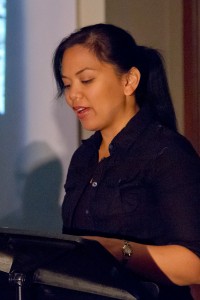Visions and Voices event focuses on water shortage
This Tuesday, USC Visions and Voices presented “Lost Borders: Water, Climate Change and the West,” a play and multimedia slideshow to exhibit the water scarcity problem in the Western United States.

Water woes · Melody Butiu, part of The Chisera, discusses the dangers of the drought afflicting Los Angeles in Doheny Memorial Library. – Austin Vogel | Daily Trojan
According to the event’s page, the Western United States has long been plagued by issues due to water, which in turn negatively affect state borders, farming, economics, immigration and most recently climate change.
The play, entitled The Chisera, was written by USC playwright Paula Cizmar. Cizmar is an award-winning scriptwriter whose work has been featured in such venues as The Jungle Theatre in Minneapolis and the American Place Theatre in New York. Cizmar has written a number of plays, including, but not limited to, The Death of a Miner, Candy & Shelley Go to the Desert and Pretty Places.
The Chisera parallels the lives of two women and displays the effects of corporate greed on the environment. The event’s title, “Lost Borders,” takes its name from the work of nature writer Mary Hunter Austin, whose life work was also the inspiration for one of the main characters. Austin’s work, as well as the play, focused on the fight to keep control of water in the Owens Valley and Austin’s struggle to engage Sacramento and the Valley’s passion for the cause.
Following Cizmar’s play, USC Assistant Professor of Earth Sciences Sarah J. Feakins led a discussion on climate change and drought in the Western United States, specifically the recent drought problem that has arisen in Los Angeles.
“We have no sense at all that anything is awry in L.A.,” Feakins said. “In Northern California, ironically, much of the water is local, and so the drought is being felt much more there.”
According to Feakins, there have been no mandatory water cuts in Los Angeles thus far, but it is recommended to residents to cut water use by 20 percent if possible.
As a geologist, Feakins noted that part of her passion arises from on-site visits and seeing the effects of the drought in person. She noted that if L.A. residents were to drive a few hours outside of the city, they certainly would “take shorter showers.”
“It’s very good for us to get out [of L.A.],” Feakins said. “We live in this bubble that is isolated.”
Feakins encouraged the audience to present on-campus solutions to the drought problem. Many audience members were happy to contribute, presenting ideas such as shutting the fountains off during the day.
“Coming back to the idea of awareness, a lot of this is a PR issue more than anything,” said one engaged audience member during the discussion. He later mentioned that he took the initiative to write a letter to the office of President C. L. Max Nikias addressing the drought issue and asking that he do more on campus in a preventative effort.
“It’s not a sustainable thing that we have going here,” another audience member said. “If you drive out a few hours, it’s a wasteland.”
Nadia Fallahi, a freshman majoring in public relations, stressed the importance of being aware of environmental issues.
“Being informed about the environment is very important,” Fallahi said. “I think that more people need to be aware of the drought and what’s going on, and how it can affect all of our lives. We need to be informed about how to act accordingly.”

